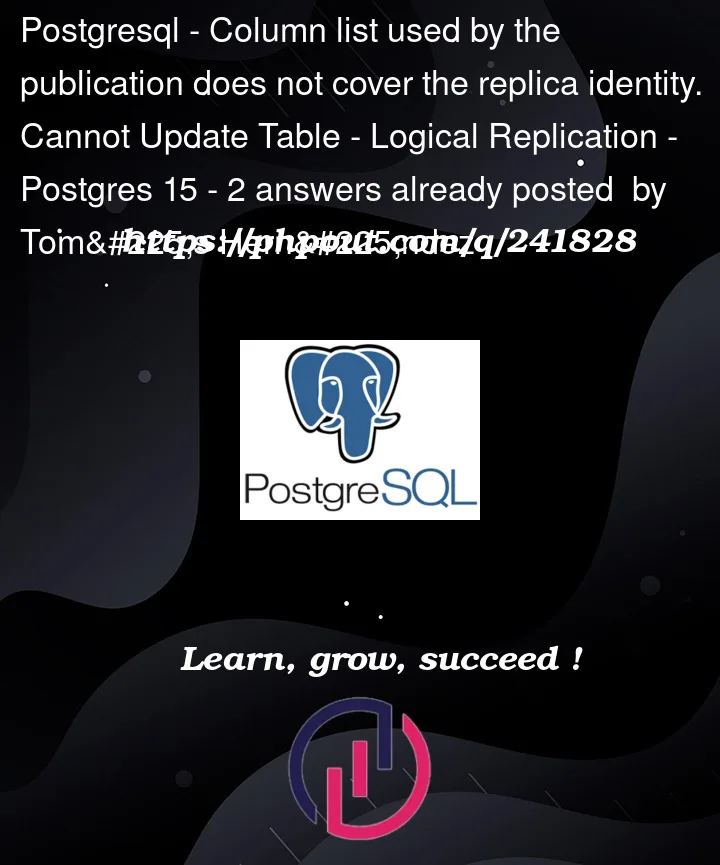We’re doing a Postgres native logical replication between two databases.
Now, we’re getting an error trying to update from the publisher one of thousand tables that we have.
When we try to update the table it returns this error:
ERROR: Column list used by the publication does not cover the replica identity.cannot update table "etiquetas_j".
ERROR: cannot update table "etiquetas_j"
Estado SQL: 42P10
Detalle: Column list used by the publication does not cover the replica identity.
The table definition, datatypes, indexes, and pkeys are the same at publisher and subscriptor
See here:
Publisher:
CREATE TABLE IF NOT EXISTS public.etiquetas_j (
etiqueta_id integer NOT NULL,
fecha timestamp without time zone,
j_id integer NOT NULL,
usuario_del_id integer,
usuario_mod_id integer,
organigrama_mod character varying(2) COLLATE pg_catalog."default",
id integer NOT NULL DEFAULT nextval('etiquetas_j_id_seq1'::regclass),
CONSTRAINT etiquetas_j_pkey PRIMARY KEY (id))
TABLESPACE pg_default; ALTER TABLE IF EXISTS public.etiquetas_j
OWNER to postgres;
CREATE INDEX IF NOT EXISTS etiquetas_j_etiqueta_id_idx
ON public.etiquetas_j USING btree
(etiqueta_id ASC NULLS LAST)
TABLESPACE pg_default;
CREATE INDEX IF NOT EXISTS etiquetas_j_id_idx
ON public.etiquetas_j USING btree
(j_id ASC NULLS LAST)
TABLESPACE pg_default;
Subscriptor:
CREATE TABLE IF NOT EXISTS public.etiquetas_j
(
etiqueta_id integer NOT NULL,
fecha timestamp without time zone,
j_id integer NOT NULL,
usuario_del_id integer,
usuario_mod_id integer,
organigrama_mod character varying(2) COLLATE pg_catalog."default",
id integer NOT NULL DEFAULT nextval('etiquetas_j_id_seq1'::regclass),
CONSTRAINT etiquetas_j_pkey PRIMARY KEY (id)
)
TABLESPACE pg_default;
ALTER TABLE IF EXISTS public.etiquetas_j
OWNER to postgres;
CREATE INDEX IF NOT EXISTS etiquetas_j_etiqueta_id_idx
ON public.etiquetas_j USING btree
(etiqueta_id ASC NULLS LAST)
TABLESPACE pg_default;
CREATE INDEX IF NOT EXISTS etiquetas_j_id_idx
ON public.etiquetas_j USING btree
(j_id ASC NULLS LAST)
TABLESPACE pg_default;
The publication is defined as follows:
CREATE PUBLICATION publication_visor FOR TABLE etiquetas_j(
etiqueta_id,
fecha,
j_id,
usuario_del_id,
usuario_mod_id ,
organigrama_mod,
id)
The error occurs when we execute in the provider:
update etiquetas_j set organigrama_mod = '02' where id = 3;
Thanks, and sorry for the bad english!
We have already checked:
- See what the indexes are.
- See what differs in both schemas.
- See what publisher was sending at publication create.
- Applied ALTER TABLE etiquetas_j REPLICA IDENTITY FULL;




2
Answers
I solved it.
For some reason, we used ALTER TABLE in the publisher side and the subscription side to make id as primary key and the schemas, indexes, and everything was identical. Enable the subscription again and refresh the PUBLICATION on the CLIENT SIDE but never worked.
I did the next steps to solve it:
ALTER SUBSCRIPTION subscription_name DISABLEDROP PUBLICATION publication_nameselect pg_create_logical_replication_slot('YOUR_NEW_NAME_SLOT', 'pgoutput');ALTER SUBSCRIPTION subscription_name ENABLEALTER SUBSCRIPTION subscription_name SET (slot_name='YOUR_NEW_NAME_SLOT')ALTER SUBSCRIPTION subscription_name REFRESH PUBLICATION;SELECT slot_name, plugin, slot_type, database, active FROM pg_replication_slots WHERE plugin = 'pgoutput';We specify the slots in the subscriptor because we have two databases at the same server instance.
When the replica identity of the table is not entirely covered by the columns provided in the publication, you will receive the error "Column list used by the publication does not cover the replica identity." In your situation, you have a publication defined on the table
etiquetas_jwith a list of specified columns. Although it is not one of the columns stated in the publication (etiqueta_id,fecha,id,j_id,usuario_del_id,usuario_mod_id,organigrama_mod), theorganigrama_modcolumn gets updated when you attempt to edit the table.You must check that the columns involved in the replica identity (primary key or unique constraint columns) are listed in the publication column list in order to fix this. The
idcolumn in your case appears to be the main key, and you’ve included it in the publication. Theorganigrama_modcolumn appears to be updated rather than being a part of the replica identity, though.The
organigrama_modcolumn needs to be added to the list of publication columns in order to resolve the problem, or you should avoid directly editing it if it isn’t part of the replica identity. To cover all columns and prevent future problems, you might also think about altering the replica identity of the table toFULL.